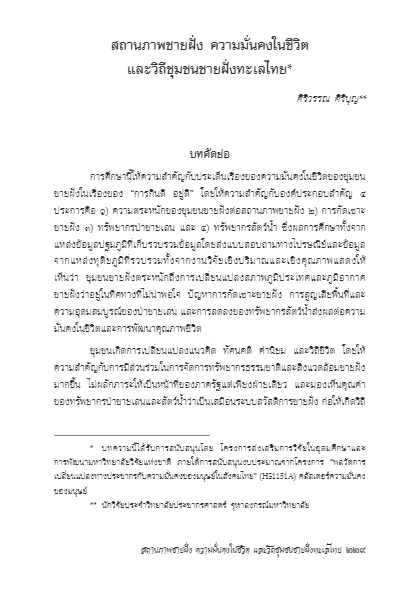ศิริวรรณ ศิริบุญ
บทคัดย่อ
การศึกษานี้ให้ความสำคัญกับประเด็นเรื่องของความมั่นคงในชีวิตของชุมชนชายฝั่งในเรื่องของ “การกินดี อยู่ดี” โดยให้ความสำคัญกับองค์ประกอบสำคัญ 4 ประการคือ 1) ความตระหนักของชุมชนชายฝั่งต่อสถานภาพชายฝั่ง 2) การกัดเซาะชายฝั่ง 3) ทรัพยากรป่าชายเลน และ 4) ทรัพยากรสัตว์น้ำ ซึ่งผลการศึกษาทั้งจากแหล่งข้อมูลปฐมภูมิที่เก็บรวบรวมข้อมูลโดยส่งแบบสอบถามทางไปรษณีย์ และข้อมูลจากแหล่งทุติยภูมิที่รวบรวมทั้งจากงานวิจัยเชิงปริมาณและเชิงคุณภาพแสดงให้เห็นว่า ชุมชนชายฝั่งตระหนักถึงการเปลี่ยนแปลงสภาพภูมิประเทศและภูมิอากาศชายฝั่งว่าอยู่ในทิศทางที่ไม่น่าพอใจ ปัญหาการกัดเซาะชายฝั่ง การสูญเสียพื้นที่และความอุดมสมบูรณ์ของป่าชายเลน และการลดลงของทรัพยากรสัตว์น้ำส่งผลต่อความมั่นคงในชีวิตและการพัฒนาคุณภาพชีวิต
ชุมชนเกิดการเปลี่ยนแปลงแนวคิด ทัศนคติ ค่านิยม และวิถีชีวิต โดยให้ความสำคัญกับการมีส่วนร่วมในการจัดการทรัพยากรธรรมชาติและสิ่งแวดล้อมชายฝั่งมากขึ้น ไม่ผลักภาระให้เป็นหน้าที่ของภาครัฐแต่เพียงฝ่ายเดียว และมองเห็นคุณค่าของทรัพยากรป่าชายเลนและสัตว์น้ำว่าเป็นเสมือนระบบสวัสดิการชายฝั่ง ก่อให้เกิดวิถีเศรษฐกิจแบบพอเพียง เป็นระบบเศรษฐกิจเพื่อความมั่นคงไม่ใช่เพื่อความมั่งคั่ง เห็นความสำคัญของการจัดการที่ภาคประชาชนมีส่วนร่วม ไม่ใช่การจัดการแบบมีพิมพ์เขียว หรือการจัดการแบบรวมอำนาจหรือสั่งการ รวมทั้งให้ความสำคัญกับรูปแบบของการจัดการแบบ “ประชาสังคม” มีการสร้างเครือข่ายความร่วมมือจากภาคส่วนต่างๆ ทั้งภาครัฐ เอกชน องค์กรอิสระ และภาคประชาชน
(ตีพิมพ์ใน วารสารไทยศึกษา ปีที่ 9 ฉบับที่ 2 (สิงหาคม 2556 – มกราคม 2557) หน้า 229-280)
Coastal Conditions, Human Security and Ways of Live of Thai Coastal Communities
Siriwan Siriboon
Abstract
This study is an attempt to examine the relationship between coastal conditions and human security. Human security has been defined in terms of the well-being of community members in two aspects; shelters and food security. In this analysis, four components were axamined: the awareness of the community of the coastal situation, coastal erosion, mangrove forests, and sea animals. The data used for the analysis was accessed from both primary and secondary data sources. A survey was perfomed by sending questionnaire to the village headmen by mail. The findings from the survey and the information from secondary data indicates that coastal communities are aware of the poor conditions of coastal resources and the environment. In addition, it has been found that the poor coastal conditions are highly associated with harm to human security and the quality of life of coastal communities.
Community security and the quality of life of community members has been threatened by the crisis of coastal erosion, the loss of mangrove and the reduction of sea animals. These phenomena have resulted in a change of attitude, values and ways of life of community members. The community members realize that coastal management cannot be done solely by the government sector. Cooperation and participation from the coastal community is needed. Coastal communities have changed their view on the value of mangroves and sea animals. Mangroves and sea animals are now viewed as an important coastal welfare system for a sufficiency economy. Coastal resources are important components for economic security not just for wealth. Participation from local communities is needed. Coastal management should be in the form of “Bottom-up Management” not “Top-down Management”. Centralization and management with a blue print should be avoided. Management under the concept of “Civil Society” and building networks among governmental organizations, non-governmental organizations, the private sector and coastal communities is recommended.
(Published in Journal of Thai Studies Volume 9 Number 2 (August 2013 – January 2014) Page 229-280)
บทความ / Full Text : Download
